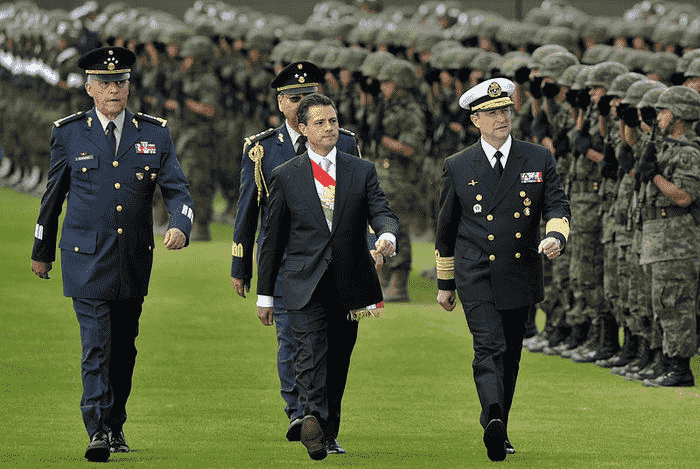Cienfuegos pleaded "not guilty" in Brooklyn court
Salvador Cienfuegos, former head of the Ministry of National Defense, more than doubled his assets during his tenure as federal secretary (2012-2018).

Salvador Cienfuegos Zepeda, former Secretary of National Defense with Enrique Peña Nieto, pleaded not guilty to the three-drug trafficking charges and one money laundering charge in a New York court.
Amid a bumpy hearing that was postponed, the retired general rejected the four crimes against him. Before Federal Judge Steven M. Gold of the Eastern District Court in Brooklyn, New York, Cienfuegos was represented by his attorneys Edward Sapone and Michael Vitaliano. With this action, the former head of Sedena challenges the U.S. government to prove the charges against him.
According to Proceso magazine, the judge read Cienfuegos the three charges of conspiracy to manufacture, import, and distribute drugs, plus one charge of money laundering. He was also asked if he understood the charges and if he knew his rights, to which he replied that he did. "Not guilty, Your Honor," was the response of the former head of the Army and his lawyers, after Judge Gold asked him his position and laid out the charges.
Previously, Cienfuegos' defense had asked for a postponement of the arraignment hearing, but this request was denied due to the difficulty of scheduling the arraignments due to calls from prison. The general's position is not surprising, since at his hearing on October 20, his then-lawyer, Duane R. Lyons, stated that Cienfuegos intended to clear his name, as well as vigorously fight the charges against him.
For this appearance, he had to plead guilty or not guilty and as he already mentioned, the former head of the Sedena denied having conspired to distribute marijuana, methamphetamine, and cocaine, as well as having laundered money from the sale of these substances in the United States.
Formally, it will be until November 18 when the trial of Cienfuegos Zepeda will begin after his defense proposed that the period of 70 days that the prosecution has to gather the evidence against the retired general begin. For the time being, the accused will remain in preventive detention, although his defense proposed the revision of a right to bail at another time since the Public Prosecutor's Office requested the judge to deny this possibility as well.
In an accidental event, the judge decided to postpone the appearance due to the noise generated by those listening at a distance, mostly reporters who did not silence their phones and intervened in the process. Cienfuegos himself requested volume to follow the case. Not even 10 minutes had passed when the general's lawyers suggested postponing.
Voices were breaking out and the judge issued a warning that the devices would be silenced or he would cancel public access, so there would be no real-time information. As this instruction from the authority was not complied with, the hearing was postponed for one hour.
After that time, the time came for the reading of the charges and that's when the former head of the Sedena said he was innocent. During the process, he communicated using signs and by moving his head to nod, since the computer from which he was following his case was emitting noises that prevented him from hearing clearly and had to be silenced.
Salvador Cienfuegos Zepeda is being held at the Metropolitan Detention Center in Brooklyn, where the former Secretary of Public Security is also being held with Felipe Calderón, Genaro García Luna, the latter accused of collaborating with the Sinaloa Cartel.
The retired general was arrested on 15 October upon his arrival at the California airport in Los Angeles. An arrest warrant had been issued against him since August 2019 by Judge Vera M. Scanlon. The process is in the same court where Joaquín el Chapo Guzmán was tried.
Whoever was head of the Army would have collaborated with the H-2 Cartel for land and sea trafficking of cocaine, marijuana, and methamphetamine, to the United States, according to the Department of Justice of that country. Mainly, he would be linked to Juan Francisco Patrón Sánchez, the H2, who assumed the leadership of a faction that had been detached from the Beltrán Leyva Cartel since 2014.
Allegedly, the military command helped the criminal organization expand from Mazatlan to the rest of Sinaloa. According to file No. 19-366 (CBA) (E.D.N.Y), Cienfuegos Zepeda agreed not to carry out operations against the group headed by Patrón Sánchez; to harm rival groups; to locate maritime transport for drug trafficking; to introduce leaders of the H-2 organization with other corrupt officials to collaborate in exchange for bribes; as well as to warn them about U.S. government investigations.
The above data was obtained by intercepting thousands of messages from a Blackberry phone that revealed the military's operations in exchange for bribes.




